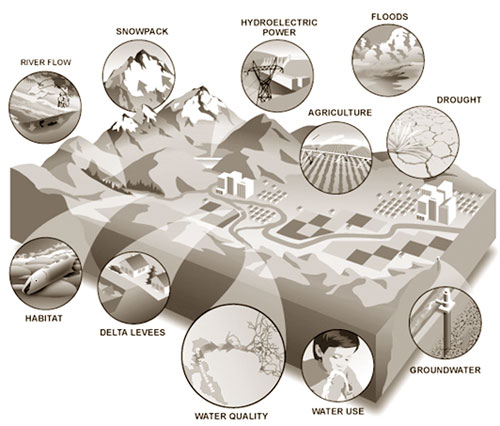Are we prepared for climate change?
 Climate change is no longer an abstract scientific phenomenon
confined to discussions and debates among scientists. Climate change is no longer an abstract scientific phenomenon
confined to discussions and debates among scientists.
All the emerging evidence shows in no uncertain terms that world is
heading for a major climate change with severe consequences. Each and
every one of us has to come to terms with this reality states Prof. S.
T. Hettige, Professor of Sociology in the University of Colombo.
Over the last thirty years world economy has undergone a major
transformation and China and India have emerged as centres of production
of various goods and services for the world market and many other
countries have also joined the competition for a share of the world
market.
The ensuing competition has created an unprecedented demand for oil
triggering worldwide price increase in oil and other products.
 The above developments have created a major crisis throughout the
world, slowing down economic growth and increasing price levels of all
conceivable goods and services. The above developments have created a major crisis throughout the
world, slowing down economic growth and increasing price levels of all
conceivable goods and services.
Given the country’s vulnerable position, it is clear that Sri Lanka
cannot afford to foot the increasing oil bill. Although diverse nations
adopt different measures to help reduce global warming, measures that
Sri Lanka may adopt will not have a significant impact on global climate
change. Nevertheless, Sri Lanka can’t escape from the inevitable
consequences of global warming.
How Can Sri Lanka adapt to climate change?
It is critically important to bring about major reforms in Sri
Lanka’s energy sector with a view to reducing current over dependency on
oil for generating energy.
The most important sector in which significant adjustments can be
made is the transport sector where substantial investments should be
made to build mass transit systems, particularly the railway.
Adding more and more buses to the existing fleet of buses with a view
to reducing cars will not be a solution in the long run, as it would be
counter productive. More buses would make already congested roads
virtually impassable compelling commuters to resort to private modes of
transport.
However, if Sri Lanka makes substantial investments in the railways
making it efficient not only to transport passengers with improved
facilities but also goods, the railway can take the pressure off the
network of roads.
This will, in turn, make road transport more efficient reducing
congestion and increasing fuel economy of vehicles.
Development planning
Another critical area where major changes have to be made is in the
overall development planning. Sri Lanka has to promote a de-centralized
mode of development planning in order to avoid major problems that are
connected with climate change.
It is obvious that the current trend of indiscriminate expansion of
urban centres such as that of Colombo will not anger well for the
wellbeing of the population as well as economic development.
Therefore, the current expansion of large urban centres has to be
stopped. Instead, the country should promote a whole range of urban
centres in diverse parts of the country. These urban centres should be
equipped with major infrastructure facilities such as hospitals, schools
and other public services.
For instance, people should not be forced to travel hundreds of
kilometers to have access to good health care facilities.
Similarly, people should not be compelled to travel long distances
for employment. Employment should also be decentralized as much as
possible. Though Sri Lanka has free trade zones and industrial parks in
several parts of the county, industries have not been decentralized so
as to create employment in the provinces.
The trend was different in the 1960s when import substitution
industries were set up in diverse parts of the country; Paper
manufacturing plants in Embilipitiya and Walachchanai and cement
factories in Puttlam, Galle and Kankasanturai and sugar factory in
Higurana, etc.
It is imperative that such changes should be brought about in order
to avoid environmental degradation associated with hyper urbanization
and formation of heat islands. Over fifty percent of the country’s GDP
is concentrated in and around the city of Colombo. This situation should
change. The wealth of the nation has to be re-distributed across the
country. Such a policy has been promoted even in developed countries
such as UK, France and Germany.
Even in Australia, de-centralized development is at work. In other
words, there is no one big urban centre where all the people try to find
opportunities. One of the positive aspects of de-centralization is that
government will be in a position to allocate resources more efficiently.
If the urban centres are manageable, these centres are going to be less
crowded and the demand for land will not be that great. Land use pattern
can be sustainable and environmentally friendly.
There will not be a need to build skyscrapers and energy intensive
houses where twenty four hour air conditioning and various mechanized
garbage disposal systems can be avoided. Instead, three or four storied
housing complexes can reduce energy use considerably. In such a set up,
a fair balance can also be struck between public spaces such as parks
and recreation centres on one hand and private spaces such as
residential areas on the other.
Currently, the demand for land in the Colombo metropolitan area, is
so high that buildable lands have been exhausted leaving little or no
public open space. In order to make city life more sustainable and
tolerable, it is imperative to promote decentralized urban planning.
Unfortunately this is not happening at the moment. In fact, the
decentralized political units such as PC’s should pay attention to
developing some urban centres in their own regions. For instance, in the
Southern Province, it is necessary to identify urban centres and develop
them as self-contained units.
The promotion of e -governance is another practical possibility to
cut down unnecessary travel by citizens. Government offices should
establish e -governance systems to facilitate official business via
email and internet.
Centres with IT facilities can be established in different parts of
the country so that even poor citizens can walk in and transact their
business with the assistance of technically competent persons running
such centres.
Savings in transport and other costs can more than off set the cost
of providing such facilities.
Climate change is essentially a product of increasing use of fossil
fuel for various purposes. Unsustainable consumption patterns that have
spread across the globe have contributed to the above trend. Increasing
production of consumer goods and services has contributed more to
increase consumption of affluent people rather than to alleviate poverty
in the developing world.
An Indian billionaire is reportedly building a 27 story house in the
middle of Bombay where incidentally the world’s largest slum is located.
What kind of housing are our real estate developers providing in the
country? You only have to scan their glossy advertisements to find the
answer.
The promotion of localized food production wherever feasible is
another strategy that we have to explore. In Sri Lanka, food can be
produced almost everywhere. Such a decentralized pattern of food
production can help reduce transportation of food items to a
considerable extent. This can be done even in urban areas, if we
establish community gardens using uncultivated land, as I have proposed
to authorities in the country in a separate article.
Preparing to face the adverse consequences of climate change is
everyone’s responsibility, not just the government. Yet, the government
has to be the catalyst and facilitator of change, including behavioral
change. Since the tasks involved are inter- sectoral, national level
coordination is critical.
May be we need a separate Ministry to develop policies and formulate
programmes to address issues of climate change.
Increasing oil prices and climate change have persuaded many
countries to divert public resources to research and development (R and
D) in the energy sector.
Such investments are also needed in other sectors such as
construction, housing, industry, and water. No doubt such investments in
other countries will result in new technological products. If we do not
make such investments, we will simply become consumers of such products,
adding to the already unsustainable import bill.
Responding to climate change is also the responsibility of the
business community, professional groups, political leaders and
consumers. The need of the hour is to review conventional business and
professional practices as well as consumption patterns in view of the
growing multiple crises across the world.
Professional bodies have to evolve new practices to suit the changing
circumstances. Business leaders should look at the environmental
implications of their business practices. Consumers have to reflect on
their consumption patterns with a view to reducing the size of their
ecological footprint. |
